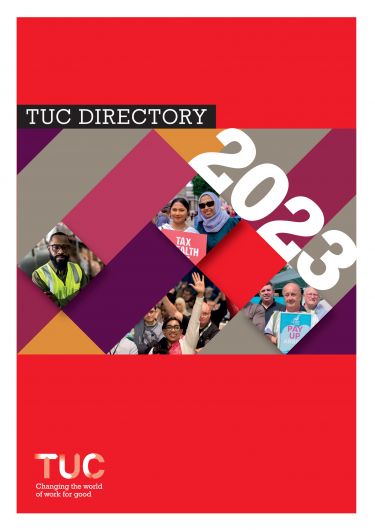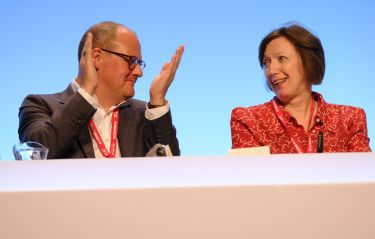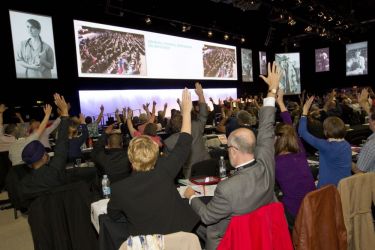General Council and TUC structure
General Council
TUC policy is set by Congress each year, but between Congresses this responsibility lies with the General Council. Its 56 members meet every two months at Congress house to oversee the TUC's work programme and sanction new policy initiatives. The larger unions are automatically represented on the General Council, with up to ten members depending on the size of the union. The smaller unions ballot for a number of reserved places. There are also seats reserved for women and black workers, and a reserved space for one representative each of young workers, workers with disabilities and lesbian, gay, bisexual and transgender workers.
The President and Executive Committee
Each year at its first post-Congress meeting, the General Council appoints the Executive Committee for the year from amongst its own members. This meets monthly to implement and develop policy, manage the TUC financial affairs and deal with any urgent business.
In the same session, the General Council also elects the TUC President for that Congress year. She or he chairs General Council and Executive meetings and is consulted by the General Secretary on all major issues.
Task groups and Committees
Task groups are set up by the General Council to deal with specific areas of policy such as learning and skills or representation at work. Committees are permanent bodies which link to other parts of the trade union movement. The Women's Committee includes members elected at the annual TUC Women's Conference as well as General Council members. The Race Relations Committee, the Disability Committtee and the Lesbian, Gay Bisexual and Transgender Committee have similar links to their own conferences. The Young Members' Forum also reports to the General Council, as does the body representing Trades Union Councils (local trade union bodies).
Committee chairs and lead responsibilities
Trade unionists on UK public and other bodies
Policy-making
TUC policy is set by the annual Congress, which meets each year in early September. All affiliated unions are entitled to be represented – the number of delegates depends on the size of the union. Congress considers motions that have been submitted by unions and by various conferences. It also receives a report from the General Council and any special statements which have been agreed for presentation to Congress. Find out more about Congress.
Policy enactment
The 56 members of the General Council meet every two months at Congress House to oversee the TUC’s work programme and sanction new policy initiatives. The larger and medium size unions are automatically represented on the General Council, and smaller unions ballot for a number of reserved spaces. There are also reserved spaces for women and black workers, and a reserved space for one representative each of young workers, disabled workers and lesbian, gay, bisexual and transgender workers.
Each year at its meeting at the end of Congress, the General Council appoints, from its own members, the Executive Committee for the year. The Executive meets monthly to implement and develop TUC policy as well as to manage the TUC’s financial affairs and deal with urgent business.
The end of Congress meeting of the General Council also elects the President for that Congress year. The new president will chair General Council and Executive meetings and is consulted by the general secretary on all major issues.
There are also committees that link to other parts of the trade union movement. The Women’s Committee includes members elected at the annual TUC Women’s Conference as well as General Council members. The Race Relations Committee, the Disabled Workers’ Committee and the Lesbian, Gay, Bisexual and Transgender Committee have similar links to their own conferences. The Young Workers Forum also reports to the General Council, as does the body for Trades Union Councils (local trade union bodies).
The TUC consults union officers in a variety of ways, both formal and informal. All these structures are supported by TUC staff. As well as sending delegates to Congress, unions also send representatives to a number of other TUC bodies – the equalities conferences and Young Workers Forum at national level and Trades Union Councils at local level. The equality conferences, Trades Union Councils Conference and Young Workers Conference have the right to submit one motion each to the annual Congress. Unions also participate in the TUC through the regional machinery.
The General Council also appoints representatives to sit on the committees elected by the other conferences. These committees in turn report to the General Council.




